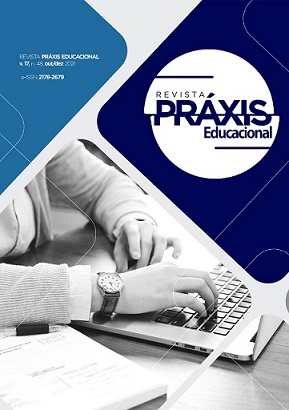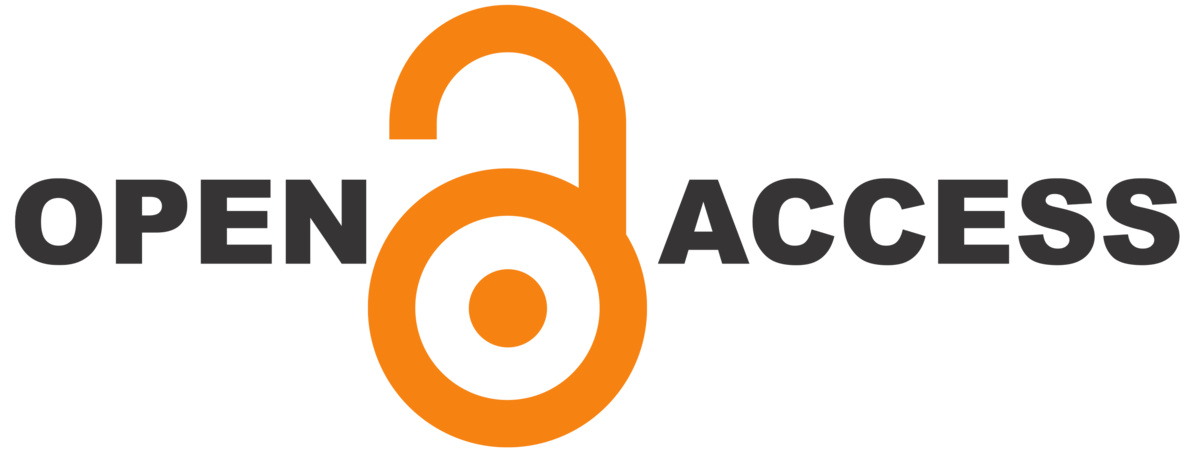Sustentabilidade da investigação em educação: da concepção à implementação de um referencial
DOI:
https://doi.org/10.22481/praxisedu.v17i48.8819Palavras-chave:
sustentabilidade da investigação, inovações educativas, investigação & desenvolvimentoResumo
Este artigo pretende apresentar um recorte do processo metodológico referente ao desenvolvimento de um referencial para a promoção da sustentabilidade de investigação em educação. Este produto decorre de um estudo de investigação e desenvolvimento (I&D), envolvendo a colaboração com diversos agentes-chave do ensino superior português (investigadores e docentes universitários) no desenho, implementação e avaliação da qualidade de estratégias e instrumentos promotoras da sustentabilidade de inovações educativas resultantes da investigação. Os dados foram recolhidos através da aplicação de questionários, realização de entrevistas e observação participante da investigadora do projeto. A análise de conteúdo dos documentos produzidos pelos participantes (ex. artigos científicos produzidos) e a análise dos registos de observação do trabalho desenvolvido na rede (observação participante da investigadora do estudo) é um processo contínuo, com ciclos de reflexão-ação para ajudar a identificar as potencialidades, constrangimentos e definir melhorias para produzir a segunda versão do referencial. Pretende-se, por fim, informar (e direcionar) a sustentabilidade de inovações educativas desenvolvidas a partir de investigação educacional financiada.
Downloads
Referências
Amado, J. (2017). Manual de Investigação Qualitativa em Educação 3ª edição. Imprensa da Universidade de Coimbra/Coimbra University Press.
Barab, S., & Squire, K. (2004). Design-based research: Putting a stake in the ground. The journal of the learning sciences, 13(1), 1-14.
Becan, J. E., Bartkowski, J. P., Knight, D. K., Wiley, T. R. A., DiClemente, R., Ducharme, L., & Hiller, M. (2018). A model for rigorously applying the Exploration, Preparation, Implementation, Sustainment (EPIS) framework in the design and measurement of a large scale collaborative multi-site study. Health & Justice, 6(1), 9. DOI: https://doi. org/10.1186/s40352-018-0068-3
Bennet, A., Bennet, D., Fafard, K., Fonda, M., Lomond, T., Messier, L., & Vaugeois, N. (2007). Knowledge mobilization in the social sciences and humanities. Frost, WV: Mqi Press. ISBN: 9780979845932
Bogdan, R., & Biklen, S. (1994). Investigação qualitativa em educação: uma introdução à teoria e aos métodos. Porto editora.
Boshier, R. (2009). Why is the scholarship of teaching and learning such a hard sell? Higher Education Research & Development, 28(1), 1–15. DOI: https://doi.org/10.1080/07294360802444321
Cain, T., & Allan, D. (2017). The invisible impact of educational research. Oxford Review of Education, 43(6), 718–732. DOI: https://doi.org/10.1080/03054985.2017.1316252
Costa, N., & Guerra, C. (2020). Contribution of the Book for Future Directions to Advance the Sustainability of Pedagogical Research and Practice. Sustainable Pedagogical Research in Higher Education: The Political, Institutional and Financial Challenges, 113.
Coutinho, C. P. (2014). Metodologia de investigação em ciências sociais e humanas. Leya.
Coutinho, C. P. (2014). Metodologia de investigação em ciências sociais e humanas. Leya.
Creswell, J. W., & Clark, V. L. P. (2004). Principles of qualitative research: Designing a qualitative study. Office of Qualitative & Mixed Methods Research, University of Nebraska, Lincoln.
Creswell, J. W., Hanson, W. E., Clark Plano, V. L., & Morales, A. (2007). Qualitative research designs: Selection and implementation. The counseling psychologist, 35(2), 236-264.
Del Pino, J. C., & Cachapuz, A. F. (2008). En busca del perfeccionamiento de una asignatura de introducción a la química en la enseñanza universitaria. Educación química, 19(4), 332-337.
Design-Based Research Collective. (2003). Design-based research: An emerging paradigm for educational inquiry. Educational researcher, 32(1), 5-8.
European Commission. (2014). Report to the European Commission on New modes of learning and teaching in higher education. European Comission. Retrieved from http://ec.europa.eu/education/library/reports/modernisation_en.pdf
European Commission. (2020). Erasmus+ Programme Guide 2020. Brussels, Belgium: European Commission.
Faber, N., Jorna, R., & Van Engelen, J. O. (2009). The sustainability of “sustainability” – A study into the conceptual foundations of the notion of “sustainability.” In W. R. Sheate (Ed.), Tools, techniques and approaches for sustainability: Collected writings in environmental assessment policy and management (pp. 337–369). London: World Scientific. DOI: https:// www.worldscientific.com/doi/abs/10.1142/9789814289696_0016
Fishman, B., Penuel, W. R., Hegedus, S., & Roschelle, J. (2011). What happens when the research ends? Factors related to the sustainability of a technology-infused mathematics curriculum. Journal of Computers in Mathematics and Science Teaching, 30(4), 329-353.
Gay, G., & Hembrooke, H. (2004). Activity-centered design: An ecological approach to designing smart tools and usable systems. Mit Press.
Guerra, C. (2007). Avaliação do storyboard e da metodologia de desenvolvimento do Courseware Sere. Mestrado, Departamento de Didáctica e Tecnologia Educativa, Universidade de Aveiro, Aveiro.
Guerra, C. (2012). Formação de professores de ciências para o uso de tecnologias (Doctoral dissertation, Tese de Doutoramento não publicada. Universidade de Aveiro: Departamento de Educação e Departamento de Comunicação e Arte).
Guerra, C. (2021). Educational research sustainability in higher education: Reflections on the concept, factors and actions for its enhancement. C. Guerra, A. Franco & M. Seabra (Eds.), Sustainable Pedagogical Research in Higher Education: The Political, Institutional and Financial Challenges (pp.7-19). Routledge. https://www.routledge.com/Sustainable-Pedagogical-Research-in-Higher-Education-The-Political-Institutional/Guerra-Franco-Seabra/p/book/9780367436087
Guerra, C. V., Moreira, F., Loureiro, M. J., & Cabrita, I. (2020). Programação tangível para a inclusão e promoção das STEM. APEduC Revista-Investigação e Práticas em Educação em Ciências, Matemática e Tecnologia, 1(1), 100-114.
Guerra, C., & Costa, N. (2016). Sustentabilidade da investigação educacional: contributos da literatura sobre o conceito, fatores e ações. Revista Lusófona de Educação, 34(34), 13-25.
Guerra, C., & Costa, N. (2016a). Sustentabilidade da investigação educacional: contributos da literatura sobre o conceito, fatores e ações. Revista Lusófona de Educação, 34(34), 13-25.
Guerra, C., & Costa, N. (2016b). Sustainability of educational research centered on innovation in Portuguese Higher Education Institutions. In Oostdam, R. J., Griffioen, D. M. E., Teelken, C., & Kyndt, E. (Eds.). (2016). The Higher Education Conference 2016. Programme Book & Book of Abstracts. decision making, 66(5), 603-618.
Guerra, C., & Costa, N. (2018). Educational innovations in engineering education: Sustainability of funded projects developed in Portuguese higher education institutions. In 2018 3rd International Conference of the Portuguese Society for Engineering Education (CISPEE) (pp. 1-6). IEEE.
Guerra, C., Correia, A., & Pedrosa-de-Jesus, H. (2014). Estratégias inovadoras de ensino e feedback potenciadas pelas tecnologias. O “caso” da Microbiologia da Universidade de Aveiro. Indagatio Didactica, 6(1), 292-311.
Guerra, C., Franco, A., & Seabra, M. (2018). IAPHE’18, innovative academic practices in higher education–How to make them sustainable: International seminar e-book. Aveiro: UA Editora
Guerra, C., Franco, A., & Seabra, M. (Eds.) (2021). Sustainable Pedagogical Research in Higher Education: The Political, Institutional and Financial Challenges. Routledge. https://www.routledge.com/Sustainable-Pedagogical-Research-in-Higher-Education-The-Political-Institutional/Guerra-Franco-Seabra/p/book/9780367436087
Guerra, C., Franco, A., & Seabra, M. (Eds.). (2020). Sustainable Pedagogical Research in Higher Education: The Political, Institutional and Financial Challenges. Routledge.
Guerra, C., Pedrosa-de-Jesus, H., Correia, A., Cunha, A., Almeida, A., & Watts, M. (2015). Promoting Academic Development trough situated critical reflection. In Transitions in Teacher Education and Professional Identities-Proceedings of the ATEE Annual Conference (pp. 267-278). Braga: University of Minho.
Guerra, C., Tavares, R., & Araújo e Sá, M. H. (2017). SCoRE’17: Science communication for researchers in education: Autumn school e-book.. ISBN: 978-972-789-526-7
Guerra, C.; Loureiro, M.J.; Senos, S. (in press). "Didactic, Technological and Social challenges in Portuguese higher education during the pandemic confinement: testimonials of experienced educational trainers". In Developing a Post-Pandemic Paradigm for Virtual Technologies in Higher Education, edited by Sandra Loureiro; João Guerreiro. PA, United States: IGI Global Publisher of Timely Knowledge.
Huet, I; Guerra, C.; Da Silva Lopes, B (in press). "Undergraduate Research in Portugal. Section IV - International Perspective / Countries". In International Handbook on Undergraduate Research: Concepts for and Experiences with Student Research, edited by Harald A. Mieg; Elizabeth Ambos; Angela Brew; Wolfgang Deicke; Susanne Haberstroh; Judith Lehmann. Londo, United Kingdom: d. Mieg / Ambos / Brew / Galli / Lehmann.
Hutchings, P., Huber, M. T., & Ciccone, A. (2011). Why the scholarship of teaching and learning matters today. In P. Hutchings, M. T. Huber, & A. Ciccone (Eds.), The scholarship of teaching and learning reconsidered: Institutional integration and impact (pp. 1–23). San Francisco: Jossey-Bass
Laksov, K. B. (2019). Lessons learned: Towards a framework for integration of theory and practice in academic development. International Journal for Academic Development, 24(4), 369–380. DOI: https://doi.org/10.1080/1360144X.2018.1549046
Levin, B. (2011). Mobilising research knowledge in education. London Review of Education, 9(1), 15–26. DOI: https://doi.org/10.1080/14748460.2011.550431
Loh, L. C., Friedman, S. R., & Burdick, W. P. (2013). Factors promoting sustainability of education innovations: A comparison of faculty perceptions and existing frameworks. Education for Health, 26(1), 32.
Neuendorf, K. A. (2018). 18 Content analysis and thematic analysis. Advanced Research Methods for Applied Psychology: Design, Analysis and Reporting, 211.
Pedrosa-de-Jesus, H., Guerra, C., & Watts, M. (2017). University teachers’ self-reflection on their academic growth. Professional development in education, 43(3), 454-473.
Pedrosa-de-Jesus, H., Guerra, C., & Watts, M. (2018). Models of Teachers’ SoTL. In Academic Growth in Higher Education (pp. 186-199). Brill Sense.
Pedrosa-de-Jesus, H., Guerra, C., & Watts, M. (2019, October). Active co-constructive written feedback: Promoting students' critical thinking in a higher education context. In Proceedings of the Seventh International Conference on Technological Ecosystems for Enhancing Multiculturality (pp. 129-136).
Pedrosa-de-Jesus, H., Moreira, A. C., da Silva Lopes, B., Guerra, C., & Watts, M. (2018). Assessment and Feedback. In Academic Growth in Higher Education (pp. 200-216). Brill Sense.
Pedrosa-de-Jesus, M. H., Correia, A., Gonçalves, F., Almeida, A., Cunha, A., Moreira, A., da Silva Lopes, B., Guerra, C., & Watts, M. (2015). Academic development in Higher Education through innovative approaches in teaching, assessment and feedback. research@ ua, 6, 36-36.
Ribeiro, J. M., Guerra, C., & Sá, P. (2016). Neri de Souza, F.; Neri de Souza, D. & Costa, AP (Orgs.).(2015). Investigação qualitativa: inovação, dilemas e desaÍos. Volume 2. Aveiro: Ed. Ludomedia (170 pág). Revista Lusófona de Educação, (34), 211-214.
Riverdale & Ideo (2012). Design Thinking for educators (2nd ed.). Retrieved from http://www. designthinkingforeducators.com/toolkit/
Sarriot, E., Ricca, J., Yourkavitch, J., & Ryan, L. (2008). Sustained Health Outcomes (SHOUT) group. Taking the long view: A practical guide to sustainability planning and measurement in community-oriented health programming. Calverton, UK: Macro International Inc.
Savaya, R., Elsworth, G., & Rogers, P. (2009). Projected sustainability of innovative social programs. Evaluation Review, 33(2), 189–205. DOI: https://doi.org/10.1177/0193841X08322860
Scheirer, M. A. (2005). Is sustainability possible? A review and commentary on empirical studies of program sustainability. American Journal of Evaluation, 26(3), 320–347. DOI: https://doi.org/10.1177/1098214005278752
Scheirer, M. A. (2013). Linking sustainability research to intervention types. American Journal of Public Health, 103(4), e73–e80. DOI: https://doi.org/10.2105/AJPH.2012.300976
Scheirer, M. A., & Dearing, J. W. (2011). An agenda for research on the sustainability of public health programs. American Journal of Public Health, 101(11), 2059–2067. DOI: https://doi. org/10.2105/AJPH.2011.300193
Schell, S. F., Luke, D. A., Schooley, M. W., Elliott, M. B., Herbers, S. H., Mueller, N. B., & Bunger, A. C. (2013). Public health program capacity for sustainability: A new framework. Implementation Science, 8(1), 15. DOI: https://doi.org/10.1186/1748-5908-8-15
Shediac-Rizkallah, M. C., & Bone, L. R. (1998). Planning for the sustainability of community-based health programs: Conceptual frameworks and future directions for research, practice and policy. Health Education Research, 13(1), 87–108. DOI: https://doi.org/10.1093/her/13.1.87
Downloads
Publicado
Como Citar
Edição
Seção
Licença
Copyright (c) 2021 Práxis Educacional

Este trabalho está licenciado sob uma licença Creative Commons Attribution-ShareAlike 4.0 International License.
Você é livre para:
Compartilhar - copia e redistribui o material em qualquer meio ou formato; Adapte - remixe, transforme e construa a partir do material para qualquer propósito, mesmo comercialmente. Esta licença é aceitável para Obras Culturais Livres. O licenciante não pode revogar essas liberdades, desde que você siga os termos da licença.
Sob os seguintes termos:
Atribuição - você deve dar o crédito apropriado, fornecer um link para a licença e indicar se alguma alteração foi feita. Você pode fazer isso de qualquer maneira razoável, mas não de uma forma que sugira que você ou seu uso seja aprovado pelo licenciante.
Não há restrições adicionais - Você não pode aplicar termos legais ou medidas tecnológicas que restrinjam legalmente outros para fazer qualquer uso permitido pela licença.












